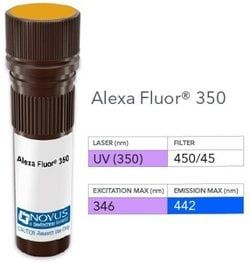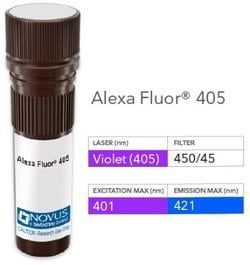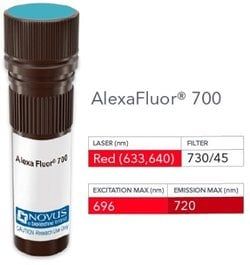Prostatic Acid Phosphatase/ACPP Antibody (rACPP/1338), DyLight 405, Novus Biologicals™
Manufacturer: Novus Biologicals
Select a Size
| Pack Size | SKU | Availability | Price |
|---|---|---|---|
| Each of 1 | NB009156-Each-of-1 | In Stock | ₹ 57,494.00 |
NB009156 - Each of 1
In Stock
Quantity
1
Base Price: ₹ 57,494.00
GST (18%): ₹ 10,348.92
Total Price: ₹ 67,842.92
Antigen
Prostatic Acid Phosphatase/ACPP
Classification
Monoclonal
Conjugate
DyLight 405
Formulation
50mM Sodium Borate with 0.05% Sodium Azide
Gene Symbols
ACP3
Immunogen
Recombinant full-length human Prostatic Acid Phosphatase/ACPP protein (Uniprot: P15309)
Quantity
0.1 mL
Research Discipline
Cell Cycle and Replication
Test Specificity
Recognizes a protein of 52kDa, identified as prostate specific acid phosphatase (PSAP). This enzyme catalyzes the conversion of orthophosphoric monoester to alcohol and orthophosphate. It is synthesized under androgen regulation and is secreted by the epithelial cells of the prostate gland. PSAP is found in non-neoplastic adult and fetal prostatic glands, primary and metastatic prostatic carcinomas. It shows no staining in granulocytes, osteoclasts, parietal cells of the stomach, liver cells, renal cell or breast carcinomas.
Content And Storage
Store at 4°C in the dark.
Applications
Immunohistochemistry, Immunohistochemistry (Paraffin)
Clone
rACPP/1338
Dilution
Immunohistochemistry, Immunohistochemistry-Paraffin
Gene Alias
acid phosphatase, prostate, ACP3, ACP-3, EC 3.1.3.2, PAP, prostatic acid phosphatase, prostatic acid phosphotase
Host Species
Mouse
Purification Method
Protein A or G purified
Regulatory Status
RUO
Primary or Secondary
Primary
Target Species
Human
Isotype
IgG1 κ
Description
- Prostatic Acid Phosphatase/ACPP Monoclonal specifically detects Prostatic Acid Phosphatase/ACPP in Human samples
- It is validated for Immunohistochemistry, Immunohistochemistry-Paraffin.



